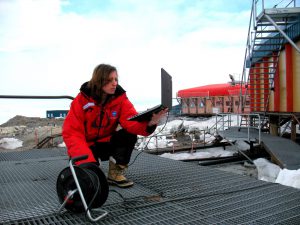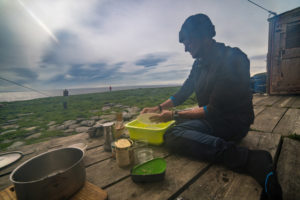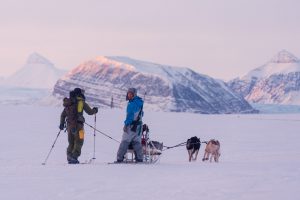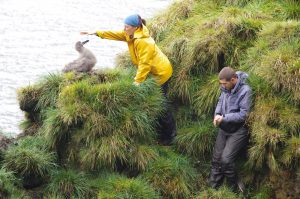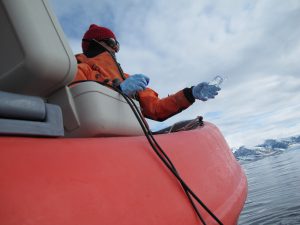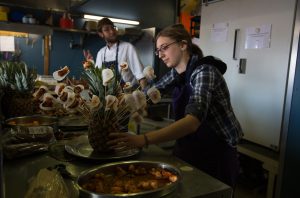Quick access

Procedure and Contracts
Each year, the Polar Institute recruits close to 40 people, overwintering and summer campaign personnel, to work in its research stations.
Recruited personnel can be distinguished based on:
- the length of the contract: summer campaign personnel are recruited for six months and overwintering personnel for 13 months on average.
- the type of position: missions are either of a scientific nature and therefore part of one or more research projects, or of a technical nature and therefore in the part of station maintenance and operation activities.
- the type of contract: civic service volunteering, international administration volunteering (IAV) or fixed-term contract.
Recruited personnel will have met the strict criteria imposed by the specific characteristics of the positions to be filled and the unique context of the French Southern and Antarctic Territories, and have passed the required physical and psychological medical examinations. Overwintering personnel stay in winter camps for at least 12 consecutive months, and are limited to a small group of people (between 15 and 60 depending on the site); therefore, given this context of isolation, one key criterion that candidates must meet is being able to integrate themselves with a group and live a community life. Overwintering personnel cannot stay in the field over two consecutive winters, i.e. two years in a row.
The recruitment procedure is broken down into several phases:
- Examination of the application files and possibly a pre-interview with the Institute’s human resources manager: between January and June for positions in the Subantarctic Islands and in the Antarctic and between July and September for positions in the Arctic.
- Medical examinations for short-listed candidates. These examinations are carried out in order to identify any medical risks in a context of limited healthcare infrastructures at the scientific stations and limited possibilities of evacuation. These medical exams include a general physical fitness exam, possibly a stress test for candidates over fifty years old and persons applying for the Concordia station, and psychological tests (questionnaire then interview with a psychologist) for missions lasting more than six months, except for the Arctic.
- Interviews with suitable candidates between March and June for positions in the Subantarctic Islands and Antarctica and in October for positions in the Arctic.
For positions related to scientific projects, personnel are recruited either directly by a jury of representatives of the projects concerned (for the chemist, veterinarian, biologist positions), or jointly between the Polar Institute and the representatives of the projects concerned (for science electronics, computer scientist, optoelectronic technician), generally in Paris.
Recruited personnel go back to their home base (the location from which they were recruited) between October and November for Antarctica and the Subantarctic Islands and in April for the Arctic.
Contracts
Civic service volunteers
The position of Civic service volunteers (CSV) is intended for people over the age of 25 years, and if an exemption has been issued by the Civic Service Agency, for young people between the ages of 18 and 25 years. A civic service volunteer can be given a contract for a duration of six months and two years; this contract must be for a mission of general interest, and the host organization must have been approved by the Civic Service Agency. The host organization finances the compensation and full social security coverage.
At the Polar Institute, CSVs are hired for six months, for a summer campaign, or 13 months on average, for an overwintering campaign. This contract is intended for young graduates with little professional experience. During their mission in the French Southern and Antarctic Territories (TAAF), SCVs are provided housing and food and they are also given a net allowance of €1,024 that is tax-free.
The access conditions are as follows:
- Volunteers must be over 18 years old.
- Volunteers must be a French citizen, a citizen of a Member State of the European Union, a citizen of a state that is a contracting party to the Agreement on the European Economic Area, or be able to justify having been a legal resident in France for more than one year by holding one of the residence permits listed in Chapter II Section 2 of Law No. 2010-241.
- The minimum level of study required is BAC +2 (two years of studies after graduation from high school), except for a few specific professional categories such as baker-pastry cook or carpenter.
These contracts are offered at the Dumont d’Urville and Concordia Antarctic stations and at the Martin-de-Viviès bases on Amsterdam Island, the Alfred-Faure base in the Crozet Archipelago and the Port-aux-Français base in the Kerguelen Archipelago.
The experience acquired by overwintering personnel is a real asset for their professional integration.
Fixed-term contracts
Fixed-term contracts are intended for experienced professionals with at least five years of professional experience. Remuneration depends on the position held, the location, the candidate’s experience and their responsibilities in the field.
This type of contract applies to the positions of technical manager, chief engineer, plumber/heating engineer, electrical technician for the power station, mechanic for diesel construction engines, and cook.
These contracts are offered at the Dumont d’Urville and Concordia Antarctic stations, for overwintering personnel only.
International administration volunteers
International administration volunteering (IAV) is a civic service carried out for French Government services abroad. It lasts between six months and two years and can be renewed once for a maximum duration of two years. It is intended for people between the ages of 18 and 28 years old.
At the Polar Institute, this contract is offered to young graduates with little professional experience at the AWIPEV station in the Arctic, and Concordia station in the Antarctic. IAVs are provided housing and food and they are also given a non-taxable net lump sum allowance of between €1,400 and €1,900 depending on where the volunteer is posted and the current exchange rate.
The access conditions are as follows:
- Volunteers must be between 18 and 28 years old on the registration date, and must leave for the mission no later than the day of their 29th birthday.
- Volunteers must be a French citizen, or a citizen of a Member State of the European Union or the European Economic Area.
- Volunteers must be up-to-date with the national service obligations, have their full rights as a citizen and have a clean criminal record, meet the physical fitness conditions required for people carrying out similar activities within the host organization and, given the diplomatic nature of the mission, they must agree to the secrecy, suitability and confidentiality obligations.
